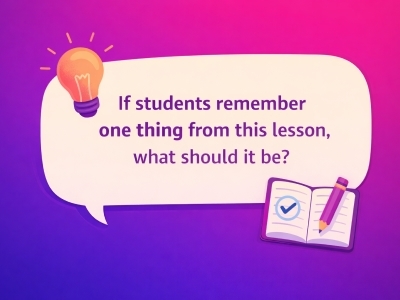How to Improve Student Attendance in Elementary School through Routine
Topics

We’ve all had the experience of truly purposeful, authentic learning and know how valuable it is. Educators are taking the best of what we know about learning, student support, effective instruction, and interpersonal skill-building to completely reimagine schools so that students experience that kind of purposeful learning all day, every day.
A before-school “Soft Start” initiative helps elementary school students transition into the school day, reducing tardiness and chronic absenteeism.
Chronic absenteeism has emerged as a significant challenge in schools nationwide, particularly in the aftermath of the COVID-19 pandemic. Nationally, more than 25 percent of students are recognized as chronically absent. “Chronic absenteeism” means a student is missing 10 percent or more of school days within an academic year, excused or unexcused—that’s the same as missing two or more days of school every month.
Missing two or more days of school every month can disrupt a student’s learning, making it difficult for them to catch up. For example, in elementary students, it can make it harder to learn to read. When a student comes to school regularly, it not only helps them to grow academically, but also supports relationship-building with peers and teachers, strengthens social-emotional skills, and ensures regular access to special services.
At Distinctive Schools, we believe attendance is an educational equity issue, and over the past two years, we’ve taken a holistic, relationship-driven approach to better understand and tackle chronic absenteeism. After conducting family listening tours and a root cause analysis, the Distinctive Schools team identified several key attendance barriers, including transportation challenges, inconsistent routines, and mental health struggles, that stood out across campuses. With this data in hand, we focused on high-impact strategies addressing what we decided was within our control. Strong instruction, meeting transportation needs, and enriching before and after school needs were key to our approach. We also reviewed policy, procedure, tracking, awareness, interventions, incentives, and celebrations—reviewing what is happening everyday in the school. Having at least one trusted adult in the building can make a big difference, so our approach included strengthening student-adult relationships, increasing family engagement, and continuing to design for and create school environments that make students feel safe, supported, and excited to be at school.
This school year, we introduced a program called Soft Start across our campuses. Soft Start is a before-school initiative designed to be a welcoming, flexible space for students to ease into their school day with the power to choose the path they need each morning. Our goal is to provide a strong routine, and to ease the transition into the school day—aiming for a good mental and emotional space to start the day. Whether students want to eat breakfast, engage in hands-on activities and sports, read quietly, or receive extra help with homework, they can choose the experience that helps them start their day feeling grounded, joyful, and ready to learn. This program also solves a common need for families, providing additional before-school support.
In elementary school, Soft Start has proven to be a powerful lever for improving attendance and reducing tardiness across the network. Here are some highlights of the programming at two of our schools:
- Chicago International Charter School (CICS) West Belden: CICS West Belden’s Soft Start program is an intentional community-building time, reflective of the school’s deeply rooted neighborhood connections. Students begin their day with calm, choice-based activities ranging from tutoring and collaborative games to mindfulness and quiet reading spaces. These options provide meaningful engagement and help ease students into the day with joy and intention.
CICS West Belden leveraged Soft Start as a vehicle for strengthening student-staff bonds and providing personalized support. The school’s robust Community Hub programming brings families into the rhythm of the school day and reinforces a strong sense of belonging. With a track record of beating both state and national chronic absenteeism rates and continued reductions in tardiness, CICS West Belden’s model shows how culture, connection, and consistency create the conditions for daily success.
- Chicago International Charter School (CICS) Irving Park: At CICS Irving Park, Soft Start is thoughtfully curated to reflect the school’s whole-child approach and long-standing commitment to high-quality family programming. With a range of organized stations—academic support, quiet rooms, social spaces, and creative activities—students are given the flexibility to enter the day in a way that fits their needs and interests.
As one of the highest-performing schools in Irving Park, a neighborhood in Chicago, CICS Irving Park pairs rigorous instruction with strong attendance culture. The Soft Start window helped reduce tardiness and ease transitions for students while reinforcing routines and positive mindsets. Staff members are deeply engaged in the process, actively monitoring participation and identifying students who may need additional encouragement or connection. Thanks to consistent family engagement and well-established before- and after-care programs, CICS Irving Park continues to build a culture where students are excited to be at school—and it shows in their attendance data.
A sense of belonging is an essential part of the school experience. We want every student to feel seen, heard, and part of our community. We increased our school-based attendance communications, provided additional communications from the network, worked with teams to develop incentives like March Madness Attendance Challenges, and engaged teachers in making calls to families to discuss absences and check in on families. By prioritizing consistent relationships, honoring student and family voices, and creating routines that work for our unique communities, we’ve seen tangible improvements in attendance and robust decreases in chronic absence.
We’ve learned that there is no one-size-fits-all solution to tackling attendance and chronic absenteeism. Addressing these challenges requires daily commitment from our teams—from school-wide programming and trusted adult relationships to thoughtful policies, incentives, and ongoing family communications.
Soft Start is one of many tools in our toolbox—but it’s a powerful one. When students start their day in a space that feels safe, welcoming, and joyful, they’re more likely to return tomorrow—and the day after that.
Photo at top courtesy of Distinctive Schools.




